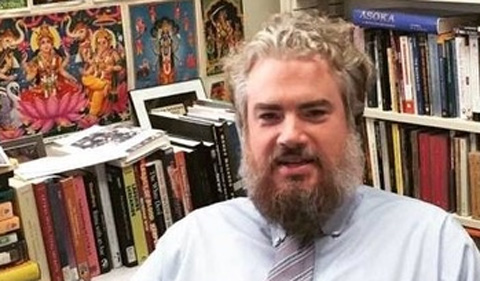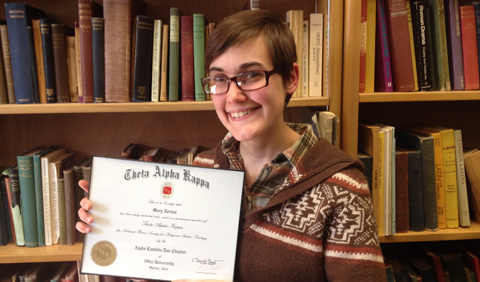
Brian Collins is the first scholar to fill The Drs. Ram and Sushila Gawande Chair in Indian Religion and Philosophy. Photo courtesy of Brian Collins
Within just five years, the generosity of two longtime Athens and Ohio University community members has helped established OHIO as a leader in the teaching, research and discussion of Indian history, religion and philosophy.
Drs. Ram and Sushila Gawande moved to Athens in the 1970s and became known for their philanthropy throughout the community. After Ram’s passing in 2011, Sushila and the Gawandes’ non-profit charity, Student and Education Support Association Inc., established the Drs. Ram and Sushila Gawande Chair in Indian Religion and Philosophy at OHIO to attract a scholar of Hinduism, Sanskrit, Indian religions and the writings and philosophy of Mahatma Gandhi.
Dr. Brian Collins is the first faculty member to hold the Gawande Chair in the Classics & World Religions Department, and since 2013, he has educated students on the significance of Indian history, religion and philosophy. He also launched the Gawande Lecture Series, which brings scholars of Indian religion and philosophy to OHIO twice a year, using funds from the Gawandes’ gift.
“[India] is a civilization that goes back thousands of years,” Collins said. “It’s the home of two of the world’s great religions and many others besides. It is a rapidly developing global trading powerhouse. Understanding India, its history and its people is crucial.”
Collins has developed classes based on the subjects most important to the Gawandes, from Hinduism and Buddhism to courses on more specialized topics, such as the history of yoga, which will be offered in the coming year. Typically, a diverse group of students opts into the classes to meet a cross-cultural requirement.
The Gawande Lecture Series has brought in various speakers to deliver lectures such as fall 2015’s “Adulterous Woman to Be Eaten by Dogs: Women and Law in Ancient India” by Stephanie Jamison from the University of California, Los Angeles, and the spring 2017 talk by Andrew J. Nicholson of the State University of New York at Stony Brook titled “Is Yoga Hindu? A Talk on the Modern Development of Yoga.”
“Students take away from the lecture series the knowledge of a different culture … and develop curiosity to know more,” Dr. Sushila Gawande said.
To promote diversity and inclusion, Collins makes an effort to equally represent female and South-Asian scholars in the lecture series. This is an important balance, Collins noted, because non-South Asians and men dominate the field of Indian religion and philosophy.
The next lecture in the series will feature Amanda Lucia, associate professor of religious studies at University of California, Riverside. Jointly delivered by the Gawande Lecture Series and the Women’s, Gender, and Sexuality Studies (WGSS) Spring Colloquium, “Touching God: Charisma, Proxemic Desire, and the Haptic Logics of the Guru Disciple Relationship” takes place Thursday, Feb. 8, at 4 p.m. in the WGSS Conference Room at 31 S. Court St. in Athens.
Lucia will analyze how the religiously devout long to be close in proximity to that which is considered sacred. Specifically, devotees believe that the act of touching a guru is sacred, which has the potential to be problematic.
“I think anybody who is interested in gender and religion, anybody who is interested in modern India, anybody who is interested in what it means to follow a guru and modern Hinduism … would enjoy the lecture,” Collins said.
For questions about the event, contact sheldonm@ohio.edu.




















Comments